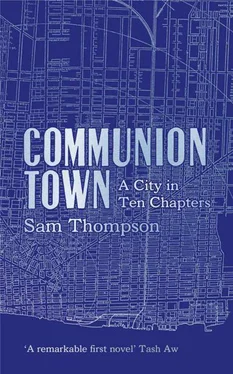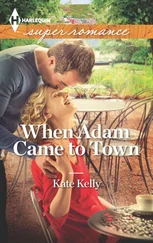I would happily have spent all my time in the slovenly female warmth of her room, sitting on the bed with the guitar in my lap, working out one song after another from her collection, or lying face to face on the pillow, my hand on her hip, watching her lips form words while her music, turned down low, murmured were they in love, or only in love with a song … On mornings when I woke up in her bed, I was perfectly indifferent to any fate I might meet that day. I wouldn’t have minded if on my way home I had been mown down by a tram or shot through the heart by a vengeful rival.
One morning she sat up and gave me an appraising look.
‘It’s my cousin’s birthday tonight,’ she said. ‘I want you to come.’
While she was at class I visited a department store and bought, for a startling price, my first suit. The fabric was scratchy, the trousers too long, the shoulders far too broad, and the whole outfit hung off me, but I supposed I’d get used to it, and to the constriction of the domino-patterned polyester tie which had come packaged with the shiny charcoal shirt. I couldn’t stretch to new shoes, but maybe my plimsolls would go unnoticed.
We rode out to Rosamunda by tram, and found ourselves in a suburb full of unobtrusive mansions behind evergreen hedges. We strolled the rest of the way to a walled garden. It was a private park for residents of the district, she explained; you paid a subscription. She spoke in low tones to a guard in a kiosk, while he gazed at me, sucking his teeth and rubbing a pimple on his cheek. He took a minute to think about it, but finally the gate opened on its pneumatic hinge.
We followed the path through the park, around landscaped hillocks and a miniature lake. For the first time this year the air was balmy. Pale green spikes poked through in the flowerbeds, and handsome iron lamp posts lined the pathway, their globes not yet lit. A game of tennis was finishing up. Other figures moved ahead of us towards the party. Beyond the lake stood a pavilion with a rococo conservatory, from which light spilled out to a terrace set with white iron tables. Decorous jazz wandered from the french windows, and as we drew closer there was the intricate murmur of voices and the chiming of glasses on glasses. The pavilion hung above the lake like the idea of another life, a future swimming in minty light and odoured evening air.
I would have liked to walk around in the dusk for longer, admiring the glow from a distance, but she was distracted. She undid her hand from mine and led the way in. Recently she had dyed her hair a chemical-looking carmine, and for a moment as she moved ahead she seemed quite unfamiliar. Bodies surrounded us. Lights flared. Someone called her name: the stream of the crowd caught and whirled her away.
The knot of my tie was pressing on my throat. Would it matter if I took it off? I couldn’t see anyone else in one. None of the partygoers, it appeared, had made any effort to prepare, but all were elegant in their soft shirts and worn jeans, short dresses and block-heeled mules. They spoke with their hands and stood with tilted hips. The music — louche, swung instrumental standards — was provided by a trio in the conservatory. Everyone seemed to be absorbed in exceptional conversations; they scintillated, debated, gossiped and flirted; their eyes were never still.
What was happening here? I saw no clues. I dodged through the crowd and paused in the shelter of a grotesque ornament, a decorative cage containing a pair of artificial brass chaffinches. As the birds hopped along their perch, a tune played from inside each of their breasts, each just a couple of tinny notes, tricking in and out of harmony, over and over. They canoodled, blinking red glass eyes, then whirred against the bars, their wings flickering faster than I could follow. I listened to them, my head touching the wires of the cage, until I began to feel conspicuous again.
Behind the bar a cohort of waiters polished glasses and mixed drinks. They wore smart navy jackets and white breeches, and their faces had been painted with such care that they seemed masks of polite white enamel, each with an identical, gentle set to the lips. Their hair, dyed poster-paint yellow, was tied in braids and secured with tiny bows. Others, identical to the bar staff, slipped deferentially through the throng, positioning their trays beneath empty glasses as the guests’ fingers let go.
All the waiters moved with the same practised discretion, wasting no gesture, spinning like weathercocks attuned to the needs of the partygoers, meeting no one’s eye. They were silent, except for the music-box tunes that tinkled away continuously in their chests. Each of them, I noticed, had a slightly different melody; you could make them out, pinging and plinking away beneath the chatter. Each repetitive phrase interlocked with the others, and seemed to fit with the trio’s jazz. I wondered if they could change tempo and key signature to match the local ambience. As they went past, I tried to lean close and hear better: perhaps it was the inbuilt rhythm and harmony of these small tunes that enabled them to serve everyone so gracefully.
The room’s clamour swelled, everyone determined to talk loud enough to drown out everyone else. Jaws worked, lips pouted, eyes danced. An outflung arm caused a waiter to veer and weave, smiling, with a loaded tray. Beyond the windows it was solid dark. The noise and heat and alcoholic humidity had fused into a thick pane between me and the room. Beside me, a youth with dark smudges under his eyes was talking to a girl in a shiny black wig.
‘How do you know her?’ he was asking.
She sighed. ‘How do you think?’
‘Um. Right. So … what do you do?’
‘ Do? I dropped out, so I work in a shop. All right?’
‘Right.’
There was a pause.
‘Um, which one?’
A longer pause. Then: ‘Dees. All right?’
‘Draughtsman Gray? Very nice!’
‘What’s nice about it?’
‘Well, it’s — it’s so exclusive …’
‘Yeah, I work in a shop. Thanks for that.’
They fell silent, although neither moved. At my other elbow, a young man in blue-tinted spectacles was leaning on the bar, smoking a cigarette. When he glanced in my direction I pulled a neighbourly face. He considered me without hurry, then looked away.
The room darkened and swam and I realised that the party was a sort of paranoid conspiracy. These ruthless creatures were watching each other in perfect mistrust. They smiled little incredulous smiles. Was something wrong with my suit? Had I overlooked some social nicety? I was the only living thing in a place full of cunningly animated mannequins. I had no idea how long I’d been in here, but I needed to get away. I pushed off from the bar and began to sidle back across the room. I couldn’t see her anywhere. I caught sight of myself in a mirror, a waxy face sprouting from an ill-fitting collar. Behind me a french window was open, and without further thought I escaped into the dark outside.
I took a breath, letting cool air flow into me, and crossed the terrace to sit on a wall. Twilight had submerged the garden, but evening was still bright above the skyline. A few partygoers were dallying out here in pairs and threes, but none paid me any mind. Seen from outside, the party appeared benign. I exhaled.
‘You haven’t spoken to me all evening.’
She sat down beside me.
‘I’m glad you’ve been enjoying yourself,’ she said in a pointed undertone. She was glaring at me. ‘I was watching, you know. You should have seen yourself. I should have known better than to bring you. Oh, don’t even try. You’ll only make it worse.’
As she spoke, it dawned on me that I had never seen her so angry. Dumbly I understood that I’d got the evening wrong. All at once it was obvious: I’d got it all wrong, somehow, from the beginning.
Читать дальше
Конец ознакомительного отрывка
Купить книгу












